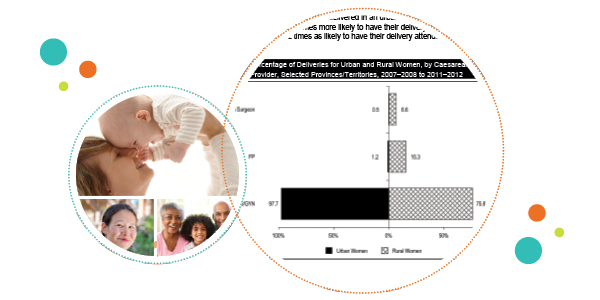Improving Caesarean section access
Back to Case studies: Working together to make an impact in health care
How data helps minimize service disruptions for Caesarean section procedures in small hospitals

Pan-Canadian data analysis contributes to the creation of collaborative groups of locum specialist physicians to improve Caesarean section access in rural and remote areas.
Customer
Ministère de la Santé et des Services sociaux (MSSS) du Québec
CIHI product
Pan-Canadian data on the volume of Caesarean sections performed in small hospitals, by physician specialty
Background

Despite a declining Canadian birth rate, rural Canada (compared with urban Canada) has a high number of births.
Compared with vaginal births, Caesarean sections (C-sections) involve additional resources and specialized personnel. Due to hospital closures and the regionalization of maternity services, many rural areas do not have access to maternity providers and services. This creates a challenge for health planners in ensuring the adequacy and availability of C-section services for those who live in rural and remote areas.
The challenge
The ministère de la Santé et des Services sociaux (MSSS) du Québec needed to understand the access to C-sections in smaller hospitals to inform future planning efforts.
The solution
The MSSS utilized CIHI’s data to extract and analyze comparable pan-Canadian data on the volume of C-sections performed in small hospitals, by physician specialty.
The impact
By comparing Quebec’s results with those for other provinces and territories, the analysis allowed the MSSS to make informed planning decisions regarding how C-sections are managed and performed. These insights led to the creation of collaborative groups of locum specialist physicians, enabling doctors to assist designated sites in 4 sectors of activity: emergency, short-term, anesthesiology and obstetrics.
Quebec’s updated provincial plans ensure ongoing delivery of care and minimize service disruption in general surgery and obstetrics, similar to the anesthesia plan that was already in place and had good results. Surgeons are now able to provide general surgical care in their community and may perform C-sections in remote sites if they have the necessary training.
By 2021, regional plans with anesthetists, surgeons and obstetricians had addressed the lack of physician resources for performing C-sections.
A need identified and addressed
Understanding the challenges of C-section access in rural and remote areas through the analysis of comparable data allowed for improved planning and better access to C-sections in rural Quebec.
Related resources
Contact us
Contact us at this email address:
Back to Case studies: Working together to make an impact in health care
How to cite:
Canadian Institute for Health Information. Improving Caesarean section access. Accessed April 25, 2025.
If you would like CIHI information in a different format, visit our Accessibility page.

